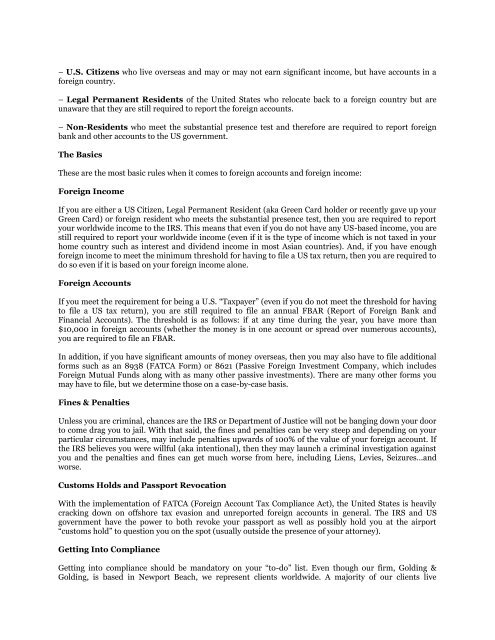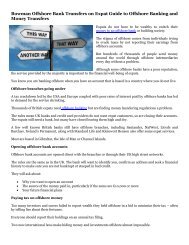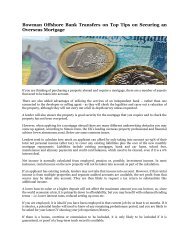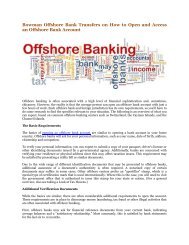Bowman Offshore Bank Transfers: Is it Dangerous to Transfer Your Offshore Money into the U.S.?
This is a question we receive often. With the implementation and enforcement of FATCA (Foreign Account Tax Compliance Act), the United States is increasing enforcement priority of noncompliant US account holders.
This is a question we receive often. With the implementation and enforcement of FATCA (Foreign Account Tax Compliance Act), the United States is increasing enforcement priority of noncompliant US account holders.
Create successful ePaper yourself
Turn your PDF publications into a flip-book with our unique Google optimized e-Paper software.
– U.S. C<strong>it</strong>izens who live overseas and may or may not earn significant income, but have accounts in a<br />
foreign country.<br />
– Legal Permanent Residents of <strong>the</strong> Un<strong>it</strong>ed States who relocate back <strong>to</strong> a foreign country but are<br />
unaware that <strong>the</strong>y are still required <strong>to</strong> report <strong>the</strong> foreign accounts.<br />
– Non-Residents who meet <strong>the</strong> substantial presence test and <strong>the</strong>refore are required <strong>to</strong> report foreign<br />
bank and o<strong>the</strong>r accounts <strong>to</strong> <strong>the</strong> US government.<br />
The Basics<br />
These are <strong>the</strong> most basic rules when <strong>it</strong> comes <strong>to</strong> foreign accounts and foreign income:<br />
Foreign Income<br />
If you are e<strong>it</strong>her a US C<strong>it</strong>izen, Legal Permanent Resident (aka Green Card holder or recently gave up your<br />
Green Card) or foreign resident who meets <strong>the</strong> substantial presence test, <strong>the</strong>n you are required <strong>to</strong> report<br />
your worldwide income <strong>to</strong> <strong>the</strong> IRS. This means that even if you do not have any US-based income, you are<br />
still required <strong>to</strong> report your worldwide income (even if <strong>it</strong> is <strong>the</strong> type of income which is not taxed in your<br />
home country such as interest and dividend income in most Asian countries). And, if you have enough<br />
foreign income <strong>to</strong> meet <strong>the</strong> minimum threshold for having <strong>to</strong> file a US tax return, <strong>the</strong>n you are required <strong>to</strong><br />
do so even if <strong>it</strong> is based on your foreign income alone.<br />
Foreign Accounts<br />
If you meet <strong>the</strong> requirement for being a U.S. ―Taxpayer‖ (even if you do not meet <strong>the</strong> threshold for having<br />
<strong>to</strong> file a US tax return), you are still required <strong>to</strong> file an annual FBAR (Report of Foreign <strong>Bank</strong> and<br />
Financial Accounts). The threshold is as follows: if at any time during <strong>the</strong> year, you have more than<br />
$10,000 in foreign accounts (whe<strong>the</strong>r <strong>the</strong> money is in one account or spread over numerous accounts),<br />
you are required <strong>to</strong> file an FBAR.<br />
In add<strong>it</strong>ion, if you have significant amounts of money overseas, <strong>the</strong>n you may also have <strong>to</strong> file add<strong>it</strong>ional<br />
forms such as an 8938 (FATCA Form) or 8621 (Passive Foreign Investment Company, which includes<br />
Foreign Mutual Funds along w<strong>it</strong>h as many o<strong>the</strong>r passive investments). There are many o<strong>the</strong>r forms you<br />
may have <strong>to</strong> file, but we determine those on a case-by-case basis.<br />
Fines & Penalties<br />
Unless you are criminal, chances are <strong>the</strong> IRS or Department of Justice will not be banging down your door<br />
<strong>to</strong> come drag you <strong>to</strong> jail. W<strong>it</strong>h that said, <strong>the</strong> fines and penalties can be very steep and depending on your<br />
particular circumstances, may include penalties upwards of 100% of <strong>the</strong> value of your foreign account. If<br />
<strong>the</strong> IRS believes you were willful (aka intentional), <strong>the</strong>n <strong>the</strong>y may launch a criminal investigation against<br />
you and <strong>the</strong> penalties and fines can get much worse from here, including Liens, Levies, Seizures…and<br />
worse.<br />
Cus<strong>to</strong>ms Holds and Passport Revocation<br />
W<strong>it</strong>h <strong>the</strong> implementation of FATCA (Foreign Account Tax Compliance Act), <strong>the</strong> Un<strong>it</strong>ed States is heavily<br />
cracking down on offshore tax evasion and unreported foreign accounts in general. The IRS and US<br />
government have <strong>the</strong> power <strong>to</strong> both revoke your passport as well as possibly hold you at <strong>the</strong> airport<br />
―cus<strong>to</strong>ms hold‖ <strong>to</strong> question you on <strong>the</strong> spot (usually outside <strong>the</strong> presence of your at<strong>to</strong>rney).<br />
Getting In<strong>to</strong> Compliance<br />
Getting in<strong>to</strong> compliance should be manda<strong>to</strong>ry on your ―<strong>to</strong>-do‖ list. Even though our firm, Golding &<br />
Golding, is based in Newport Beach, we represent clients worldwide. A major<strong>it</strong>y of our clients live







